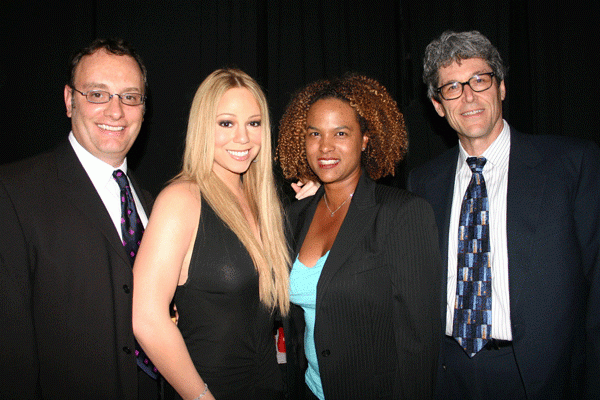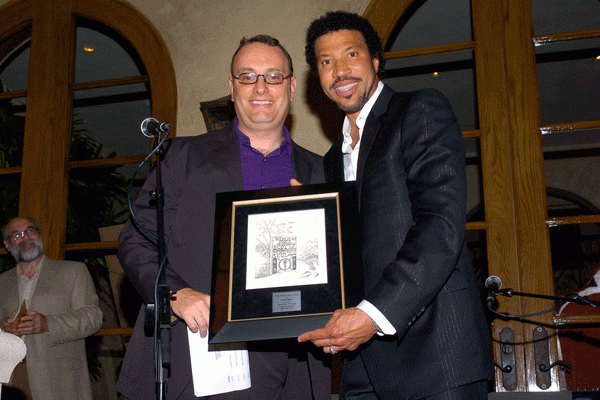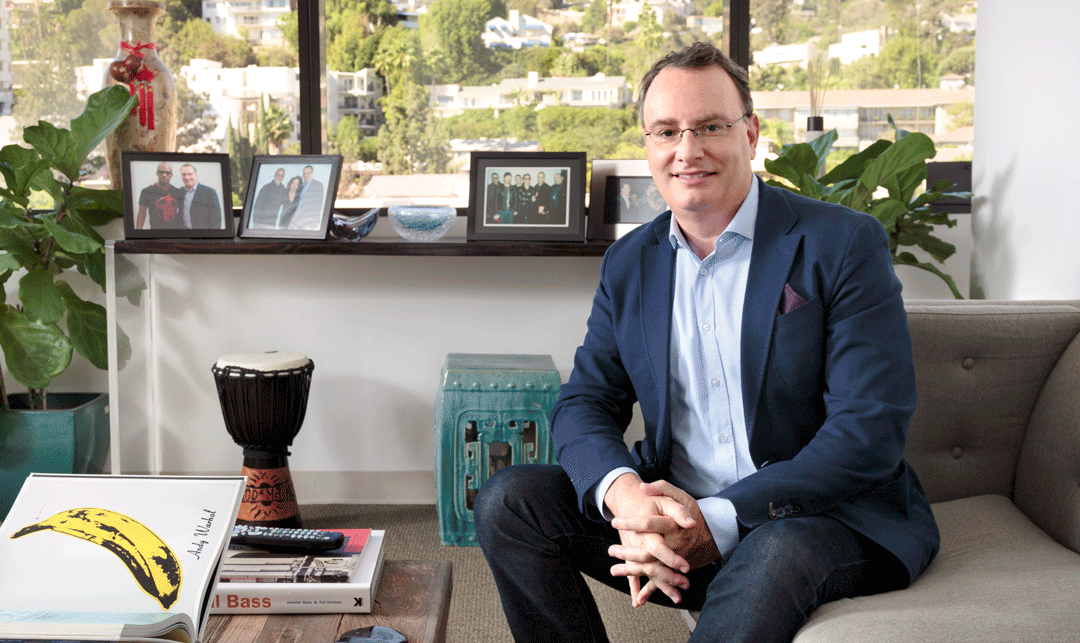Spirit Music Group CEO and Chairman David Renzer figured out early on in his career that music publishing is a good place to be as a music lover. A lifelong self-described “music dilettante,” he started by playing keyboard in bands during high school. Later at NYU, he read Billboard and hung around the music department where he played in a jazz ensemble.
Even in his youth, Renzer knew he wanted a career in entertainment, and he had his eye on industry leaders Clive Davis and David Geffen as role models. Their stories inspired him to attend law school with the goal of becoming an entertainment lawyer. “I thought, ‘now that’s a career path I can follow!’” he says. Fast forward a couple decades and now he can call Davis a friend and colleague.
Ironically, it wasn’t law but his music that broke him into the industry. In 1985 he co-wrote the song “Electric Lady” performed by Con Funk Shun that went to Number 4 on the Billboard R&B singles chart. This introduced him to executive Barry Weiss of Jive Records—one of the hottest labels at the time. Through Weiss he landed a job working for Jive’s parent company, the conglomerate Zomba Group, which was an industry leader for some of the earliest hip hop crossover hits with artists like Houdini and Kool Moe Dee.

Renzer with Mariah Carey; Donna Caseine, Senior VP of Reservoir; and author Don Passman
It was at Zomba that Renzer learned the trade from co-founder and owner Clive Calder, whom he calls one of the most successful entrepreneurs in the music business. “When I was starting out, the modern entrepreneurs like Clive also ran many of the hip hop labels. He had an ability to be both a business and creative visionary. He and many of those guys are still around and actively shaping the industry today. The successful entrepreneurs of the music business [like Clive Calder] have always been a key inspiration.”
For a music lover like Renzer, music publishing was the perfect spot to nurture new talent. At Zomba, Renzer handled the music publishing of songwriters such as Robert John “Mutt” Lange, and writers on Britney Spears and Backstreet Boys hits. “I loved seeing talent at that early stage,” he says, “signing artists as teenagers and seeing them blow up.”
In his decade spent running the North American publishing operation at Zomba, he went from being the eighth person hired, to being part of a team that grew to over 300 employees by the time he left. By then he was the senior vice president and general manager and ready for even bigger opportunities.
Universal and Beyond
MCA Music Publishing eventually grew into Universal Music Publishing Group, with Renzer helping to build it into the number one publisher in the industry based on revenue. Renzer oversaw deals negotiating music rights with major film and TV companies like Warner Bros., Dreamworks, and HBO. He played a key role in signing/negotiating an incredible portfolio of A-list talent, including Prince, Mariah Carey, Justin Bieber, Elton John, and The Beastie Boys, among many others.
During his 15 years at Universal, Renzer advanced to chairman and CEO, serving from 2004 to 2011 and growing it exponentially via a series of acquisitions, including Zomba. Notably, he oversaw the record-breaking $2B acquisition of BMG/Bertelsmann in 2007 (which included Zomba Music), making Universal Music Publishing Group the industry leader in pop music publishing, Christian music publishing, classical music, and the production music library business.
Its international presence expanded to more than 50 offices around the world.
In 2011 Renzer felt he had hit a career milestone and was ready to do something different. He partnered with Haim Saban for a year as president of music ventures for Saban Capital Group, but ended up moving on after building a relationship with Pegasus Capital Advisors, the main financial supporters of Spirit Music Group.
Renzer joined Spirit in 2013 as chairman and was promoted to chairman and CEO in 2017. “In some ways,” he reflects, “I’m back on the independent entrepreneurial side again, utilizing the experience and relationships that I’ve developed over the years.” He has put that experience to work: Since his arrival Spirit’s net publisher share has doubled and they music group has expanded its presence in the industry as well.

Lionel Richie hosted Songs of Hope III, which was founded by Renzer, raising over $150,000 for the City of Hope
One of the first acquisitions after his coming on board was the purchase of Cal IV Entertainment, a Nashville music publishing company. This gave Spirit additional staff, a great catalog, and a recording studio right on Music Row in Nashville. Acquisitions weren’t limited to Nashville. Spirit now has about 60 employees worldwide in New York, Los Angeles, Nashville, the UK, and the Netherlands.
“We established Spirit Production Music through an acquisition in Los Angeles. We have the Spirit Music Collective, Spirit Music Nashville, a UK operation partnering with Spirit B Unique, and our Latin division, Spirit Music Latino,” Renzer says.
Latin music is one of the fastest growing genres this year, growing almost 40%, and publishers are taking note. “What’s changed is that the music is translating in countries that don’t speak Spanish,” Renzer explains. “People love the vibe and culture.”
Chorus to the Bridge
Engaging in culture is something that is important to Renzer, both in his work and in his philanthropic efforts. He is involved in a number of charitable organizations, such as Creative Community For Peace, which deals with the cultural boycott of Israel, and the Foundation of Ethnic Understanding, which builds bridges between Black, Muslim, and Jewish communities.
“Philanthropy is an important part of my life,” Renzer emphasizes. He also serves on the executive board of City of Hope, where he was head of the entertainment division. With support from his role model and mentor Clive Davis, he launched the charity event Songs of Hope, which has raised nearly $4M for City of Hope Hospital.

Dave Stewart, Randy Jackson, and David Renzer
Music and entertainment have a powerful influence, not just in philanthropy and business but also for everyone, regardless of culture. Through his position on the board of the National Music Publishers Association (NMPA), and the board of SoundExchange, Renzer is committed to updating laws surrounding how music is licensed and encouraging free-market policies so that artists can build sustainable careers and more people can enjoy their art.
“The truth is,” Renzer observes, “people’s love for music never went away. Music plays an important role in people’s lives. It’s how you remember special moments. Now people with a passion for music have even more tools, like streaming services, to discover and enjoy music. It’s great to be back in a growth industry.”














































